- Home
- Simon Mayo
Mad Blood Stirring Page 2
Mad Blood Stirring Read online
Page 2
‘It’s hard to whistle and look unhappy at the same time, isn’t it, Mr Roche?’ said Joe.
‘It is when you ain’t got no teeth,’ said Roche.
They marched and whistled towards a village; small, barely lit houses peppered the sides of the road. A newly built church stood closed and dark, piles of unused slate still propped up against its walls. A few curious souls looked up as they passed, most frowning. Prisoners, they had seen before; cheerful prisoners, they most certainly had not.
The road curved right and the ghost town they had seen from across the fields disappeared behind twenty-foot-high walls. The whistling faltered and a sudden cry of ‘Sweet Christ!’ told Joe they had arrived. It was impossible to see where the granite ended and the clouded, darkening sky began.
‘What kind of an English Hell is this?’ muttered one of the sailors.
‘John Bull’s finest dungeons for Uncle Sam’s finest sailors, Mr Lord!’ called Joe.
They approached the outer wall, its centrepiece a monstrous, angular arch. Huge slabs supported two heavy wooden gates, both reinforced with bolted metal bands. Sentries, oil lamps already lit, stood by them, watching their approach. Joe squinted at the two words that had been chiselled into the keystone at the arch’s apex.
‘Parcere subjectis,’ he read.
‘What’s that, then?’ asked Roche.
‘It means “Spare the vanquished,” I think.’
‘Spare the vanquished,’ repeated Roche. ‘And how would you know that?’
‘Oh, just more Devonshire talk, Mr Roche, that’s all.’
‘Is that right?’ said Roche, persisting. ‘An’ how might they be sparin’ us, then?’
‘Who knows?’ said Joe. ‘Maybe it just means they ain’t gonna kill us all. Not yet, anyway.’
The older man shrugged. ‘If you say so. I don’t find much comfort in them words myself,’ he said.
‘Maybe that’s the point,’ said Joe.
Two large houses had been built into the wall, one either side of the gateway. Faces flitted briefly in the window of one before rapidly disappearing again.
Will Roche cleared his throat, then called to his shipmates.
‘Gentlemen of the Eagle, we have come a long way together. We are, as you see, about to take new, fashionable lodgings. And when we see the poor, miserable English faces of our captors, we might need to sing again. If anyone needs some good ol’ American cheer, it’s these poor wretches. If we can’t put a sword through their chests, we should try to put a song in their hearts.’
The gates swung open and the Americans struck up their song again, the few hesitant, faltering voices drowned out by the wilfully defiant.
A wide courtyard sloped away before them. Plain slate buildings lined the far wall, larger ones standing hostile behind them. Once more, twitching curtains caught Joe’s attention. A face at the window – a woman, Joe thought, this time – but she was gone in an instant. From somewhere within the echoing walls – it was impossible to judge where – wild yelling, cheers, howls: the unmistakeable sound of a brawl. The sailors exchanged nervous glances.
‘Sounds more like a madhouse,’ muttered Roche.
Six guards stood waiting for them. Their sergeant saluted the nearest militiaman and they exchanged a few hasty words before cheerfully peeling away, clearly delighted to be free of their crazed American prisoners.
Now the sergeant took over the shouting.
‘Enough! Enough!’ he barked, a livid scar pulsing on his forehead. ‘Can’t you see where you are? Most Yankees shit in their breeches when they see where they’re heading.’ He rocked on his heels. ‘And the French would have burst into tears, but they’re gone now, thank Christ. It’s just you Americans, all the way from Block One to Block Seven. This is Dartmoor. You might have heard of it. Word spreads. And it’s all true.’ He widened his stance, as if expecting a challenge. ‘I’m Sergeant Cox. Most times, I’m called Ol’ Fat Bastard, but you will call me Sergeant Cox or sir. In fact, you call anyone in a red coat sir and it’ll go better for you. Treat us all as officers. Especially as all of yours are miles away, in their fancy billets. You, on the other hand, are all in Block Seven. It’s full, of course, but if we keep capturing you Yankee buggers, we got to squeeze you in somewhere. So bloody move along there! You can howl your American songs at each other all night if you wish.’
A scrawny, leather-faced man, a gunner from Indianapolis called Jon Lord, raised a timid hand. ‘What’s goin’ on, Sergeant Cox? Is that some kind o’ fight you’re takin’ us to? ’Cos it sure sounds like one.’
The sergeant looked as though he might be thinking of smiling. ‘Welcome to Dartmoor,’ he said.
The prisoners were herded through another arch, this one topped with an alarm bell, towards more high walls and another pair of huge wooden, closed gates, these slotted shut with a thick iron bar. This was the inner wall they had glimpsed from across the fields.
‘Well,’ muttered Roche. ‘Let’s see what games they play here, then.’
Four sentries raised the bar and swung the gates open. The square beyond was playing host to a fight, but not of the kind they had been expecting.
‘Well, I’ll be goddamned!’ said Joe. ‘It’s a boxing match.’
The high-walled square rolled away downhill to more iron gates, this time open and draped with prisoners clamouring for a view. Behind them towered seven enormous, ghost-grey prison blocks. And in their shadow, a feverish crowd, many hundred strong, was watching two men spar.
The crew of the Eagle were marched unnoticed into the square, their guards halting to watch the fight. The boxers, one black, one white, were already exhausted, bruised and bloodied. They stalked or staggered in a makeshift ring as the crowd swarmed around the affray, ebbing and flowing, yelling encouragement, waving their pipes, exchanging money.
‘The blackjacks have their man then,’ said Roche, nodding at the far corner of the square. The crowd there was more tightly packed, black sailors shouting out their support, shaking their fists. Around them, white sailors jumped and hollered with equal fervour.
On the few occasions that the hubbub dropped, a single resonant voice could be heard issuing a steady stream of coaching advice.
‘Push forward, push forward. Lean with your head, right foot first. Tie ’im up, push ’im back, push forward.’ Joe and Roche exchanged glances; who was talking and who the words were intended for was impossible to tell.
‘Who’s the coach?’ Joe chanced asking the nearest guard, but he just shrugged and continued watching.
‘Careful,’ warned Roche in a low voice, but Joe tried again.
‘This happen much?’ he asked, as casually as he dared.
‘He might answer,’ whispered Roche, ‘or he might run you through …’
The guard peered at Joe, sizing him up, perhaps considering Roche’s options. He shrugged again.
‘Sailors like to fight,’ he said. ‘It’s what they do.’
Joe persisted. ‘Big crowd,’ he said, but the soldier was done talking. Through the multitude, Joe could see that the black boxer had his opponent in a headlock, his free fist smashing relentlessly into the white man’s face. And then the man went limp. Sensing imminent victory, the black man released his grip.
But the white boxer wasn’t finished. From somewhere, he found a shaft of wood. To huge cheers from the white sailors, he flourished it like a rapier and the black boxer backed away. Joe couldn’t see what happened next. The men of the Eagle heard the uproar, they saw the crowd surge, then they witnessed a black giant of a man climb into the ring, grab the black boxer with one hand and flatten the white boxer with the other. The snapping of bone and cartilage – presumably the white man’s – crackled around the walls. Around the ring, scuffles broke out and the guards readied their rifles.
‘By me!’ called Roche, and the Eagle men inched closer. Joe noticed for the first time that there were guards stationed on top of the far wall – they, too, had their guns aimed
at the melee.
‘This is bedlam!’ called Goffe. ‘No one’s goin’ to listen to us here. No one will hear our news. How are we gonna tell ’em anythin’? They ain’t listenin’ to nobody or nothin’.’
Joe took a deep breath. ‘We sing.’
‘What?’
‘We sing.’
‘They’ll crucify us.’
‘Just do it.’
It was just Joe and Goffe to start with, but the crew caught on soon enough. Within moments, all the Eagle men were belting out ‘Yankee Doodle’. By the second verse, heads were turning and, by the third, the fights in the crowd were breaking up.
‘We must look ridiculous!’ shouted Roche, mid-chorus.
‘Yup,’ agreed Joe. ‘Keep going.’
‘Do you think they can tell we’re from out o’ town?’ Roche grimaced.
Joe glanced at the men in the crowd; their various shades of uniform-yellow were a big contrast to the bedraggled, sodden tatters worn by the Eagle crew.
‘I guess they can,’ he said. ‘I guess they can.’
By verse six, they had everyone’s attention. The crowd drew forward. Puzzled, curious faces mixed with the angry and the combative.
‘What’s with the noise?’ called one man.
‘Where you fellas from anyways?’ called another.
Joe got the nudge. ‘Go on, then,’ said Roche, ‘and pray God you got it all right.’
‘But I don’t speak for the ship,’ hissed Joe.
‘You do now,’ insisted Roche. ‘Tell ’em – before they fight us.’
A group of pale men, each with a long, forked beard, had forced its way to the front. They squinted hard at Joe.
‘What in sweet Jesus’s name is going on?’ said one, his eyes perusing the members of the Eagle crew.
His bafflement, Joe realized, was only temporary. He’d want to hit someone soon enough. The man tugged at his beard as he spoke.
‘We gotta fight on here, in case you hadn’t noticed,’ said one. ‘You boys wanna join in, or you got somethin’ to say?’ He squirted tobacco juice from the corner of his mouth, then waited, arms folded. The challenge was clear.
‘Sure,’ said Joe, swallowing hard. He glanced briefly back at his crew, then to the sea of faces in front of him. High on the far walls, even the redcoats were watching. ‘My name is Joe Hill, and these are my shipmates.’
‘Can’t hear!’ floated a voice from the crowd. ‘Louder!’
Joe swallowed again, and imagined he was shouting into a gale. ‘We are what remains of the crew of the Eagle, out of New York. We were captured off Halifax, then held on a prison ship off Plymouth.’
He could hear his voice bouncing off the walls: everyone could hear him. On the never-ending march from the docks, it was the promise of this moment that had kept his feet moving.
‘I’ve got some news you might appreciate. The captain of the prison ship was this morning being informed by his commander that a peace treaty has been signed between America and Britain and that, even now, ships are taking the papers to Congress.’
He stared out at his astonished, disbelieving audience. Even the bearded man in front of him had stopped chewing to process the information. Behind him, Roche muttered, ‘Cannons all loaded, Joe. Fire at will.’
Joe nodded. ‘Gentlemen, the war is over!’
1.2
The Market Square, Lower Gates
‘IT’S A TRICK.’
‘What?’
‘It’s a trick. A goddamn trick.’
‘I know what you said, Ned, jus’ not why you said it.’ The two black sailors had to shout above the wild celebrations.
‘’Cos it’s the truth, and you know it, Habs.’ The taller of the two men – round-faced, bald-headed, liberally spattered with boxer’s blood – spoke.
‘What we just saw, that was a trick. The white boy appearin’ from nowhere, jus’ when we was winnin’. Them Rough Allies are at it again.’
‘Winnin’?’ said Habakkuk Snow, his hazel eyes wide with incredulity. ‘Our boy jus’ been hit by piece o’ wood the size of a damn frigate. Smashed his face in. That’s mostly his blood on you, in case you ain’t noticed.’
‘I’da had him patched up, Habs. I got my tricks. John’s a tough boxer. He’d’ve come back stronger …’ Ned Penny pushed himself away from the huge retaining wall at the bottom of the square and stooped to pick up a large brass oil lamp.
‘He was out cold, Ned!’ Habs was speaking loudly now. ‘He wasn’t comin’ back from nothin’.’
Four men danced between them, and Ned tried to swat them away with the lamp.
‘And I say that if that white boy hadn’t arrived from who knows where, there’da been a riot here. The shame of it! We lost respect is what we did.’
‘You lost money is what you mean.’
‘That, too,’ said Ned. ‘The King got it all wrong.’
‘The King got it right,’ countered Habs, shaking his head in wonder, his black-and-ivory hoop earrings swaying as he did so. ‘Probably saved that boy’s life.’
The older man coughed doubtfully. ‘S’all very convenient, if you ask me,’ he said.
Habs shook his head and laughed, his corkscrew hair as animated as he was. ‘But Ned, that ain’t even the main news no more. It’s true they stole the fight. ’Course they did – they steal everything. But look aroun’ you. The war is over – we’re goin’ home!’
Around the square and the remains of the boxing ring, dancing and singing had taken hold. Fiddles, whistles and alcohol had appeared in an instant; even the soldiers were smiling. Ned shook his head, tugged at Habs’s blue military-style jacket.
‘Ain’t you learned nothin’?’ he said. ‘You just gonna trust that white boy who you ain’t never seen before, from a ship we ain’t never heard of? Who don’t even sound like no American neither? He tells us tales of peace ’n’ joy, and you swallow it jus’ like that? Man, everyone done lost their head today.’
Habs’s shoulders drooped – he knew there might be something in what Ned was saying. Eighteen months in this godforsaken hole had taught him that betrayal was cheap and as common as bed lice. Instinctively, he looked for his old shipmates from the Bentham, but amid the mass of men in the square found only one. He saw his cousin approaching, a pipe clenched between his teeth and a bottle in his hand.
‘Let’s ask Sam,’ he said. ‘He was farther up the square. He mighta heard more …’
Ned laughed scornfully. ‘O’ course. Let’s ask the cook. He’ll know what’s goin’ on.’ Lighter skinned and slighter than Habs but with the same electric hair, Sam Snow eased past a final line of singing prisoners, his arms spread wide.
‘Hey, cuz! We goin’ home!’ he said. They embraced and Habs felt his cousin sag against him. ‘Feels good to say them words and believe ’em.’
Habs wiped a tear from Sam’s face. ‘You goin’ soft, old man?’ he said.
‘Uh-huh. Been here too long, Habs,’ said Sam. He wiped the other tears away himself. ‘Too many sick, too many dead.’
‘Too many English,’ added Ned. ‘Always watchin’, always aimin’ their guns.’
‘Amen to that,’ said Habs. ‘And you believe it, Sam? You believe that skinny white boy?’
Sam looked taken aback. ‘Believe what? That the war is over?’
‘Ned thinks it’s a trick,’ said Habs.
‘Ned thinks everythin’s a trick,’ said Sam. ‘When that cannonball took his ear, it took most part of his sense, too.’ He nodded at Ned, who was pretending not to listen but rubbed what remained of his right ear anyway. ‘For a lamplighter, Ned, you don’t see too much.’
Ned shrugged.
‘Who would you believe?’ asked Habs. ‘Who needs to tell you, Ned? President Madison? Their mad ol’ king?’ He picked some candle wax from his jacket, then checked all eight buttons were secure. ‘If all this’ – he swept his arms around the square – ‘if all this is for nothin’, this place would riot. Even the English ain’t that
stupid.’
‘So you always say,’ said Ned, examining the lamp’s wick, ‘but the English they send here are. We get the dumbest they have. It’s insultin’.’
Habs laughed. ‘You think everythin’s an insult, Ned. Every day you survive without a brawl is a goddamn miracle.’
Ned shrugged. ‘Uh-huh. Sometimes you jus’ have to fight. You ’scape from the Red River plantations, ’sjus’ what you do. You run north from Louisiana, ’sjus’ what you do. Lord knows it. King Dick knows it.’
‘And our boxer?’ said Sam. ‘Is the King sortin’ him? ’Cos, war or no war, lot of us still mighty vexed ’bout the way that fight finished.’
Habs, realizing Ned was about to make another speech, cut across him. ‘King Dick is sortin’ John, and then he’ll sort the bastards in Six. You know he will. He knows their fighter got that wood handed to ’im by one of the Allies, he saw ’em do it. We all saw it. Took it from the ring.’
‘Tha’s what I seen, too,’ said Sam. ‘And that blond white boy that made the speech? Him with the shaved head, tricorn hat?’
Habs nodded. ‘What about him?’
‘You seen what he’s doin’?’
Habs hadn’t seen, so he peered into the throng. The boxing crowd of several hundred had become an end-of-the-war, end-of-the-year party; the singing and cheering had summoned the entire prison population.
‘Can’t see nothin’. It’s gettin’ dark, Sam! Need your lamps, Ned!’ he shouted back. He waited for the crowd to move, but there was no sign of the boy in the tricorn hat. He had disappeared. Habs thought he recognized some of his crew, but the tricorn was nowhere to be seen.
‘Get closer!’ called Sam. ‘He’s in there somewhere.’
‘Why?’
‘Just do it, cuz, you’ll see.’ Sam waved him away and Habs began to squeeze his way further into the square. As the last of the watery daylight faded, the lamplighters appeared, earning their extra sixpence. Their oil lamps swung high in the corners of the market square.
‘Come and dance with us, Habs!’ shouted a young black sailor wrapped in a roughly painted Stars and Stripes flag.
‘You can’t dance, Tommy!’ Habs called back. ‘And you’re a lousy fiddle player, too.’ He saluted the boy and pushed on. Close to where the boxing ring had been, Habs caught a glimpse of the tricorn boy. He’d drifted to the edge of his crew, crouched low on the ground, pulling bits of extravagantly painted wood from the smashed boxing ring. Oblivious to the scrum around him, he was examining the rough joints of a snapped timber. Habs watched his brow furrow, a single line appearing beneath the hat’s brim, and he realized what had caught Sam’s attention. Very slowly, Habs’s face broke into the broadest of smiles.

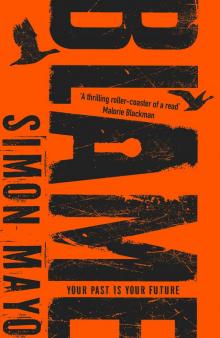 Blame
Blame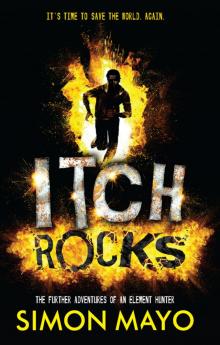 Itch Rocks
Itch Rocks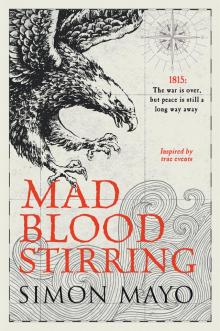 Mad Blood Stirring
Mad Blood Stirring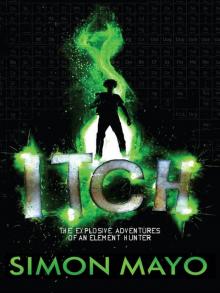 Itch
Itch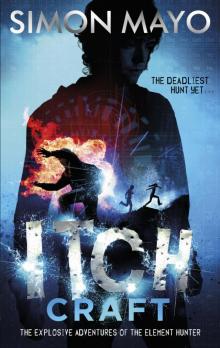 Itchcraft
Itchcraft